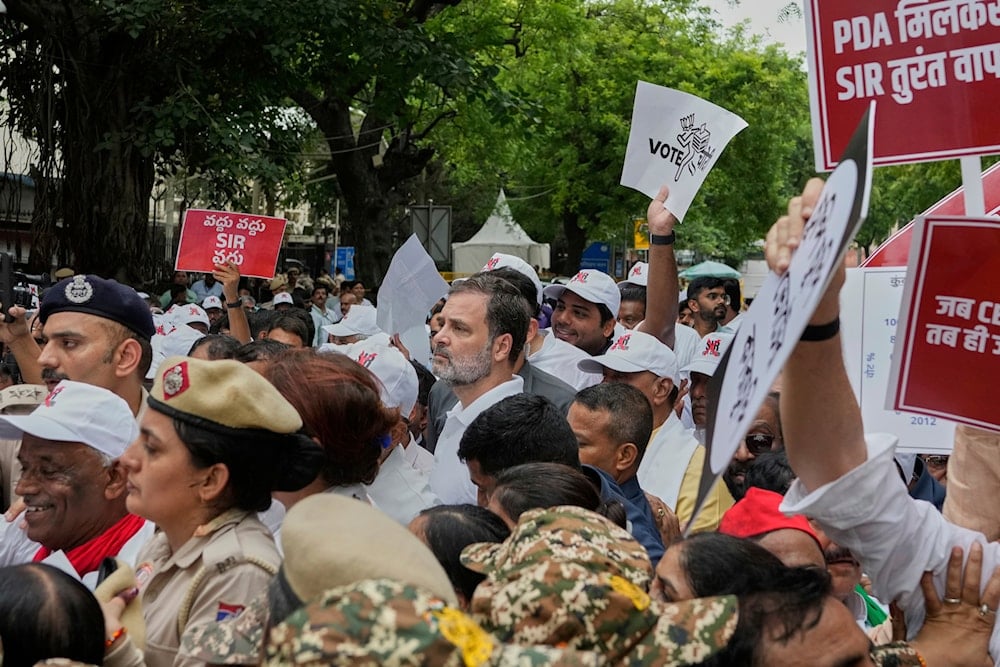Rahul Gandhi, opposition leaders, detained during New Delhi protests
Rahul Gandhi is detained in New Delhi during a protest over the Bihar electoral roll after accusing BJP of “vote theft” and demanding transparency.
-

India's Congress Party leader and leader of opposition Rahul Gandhi, center, and other parties' lawmakers are stopped by police during a protest, in New Delhi, India, Monday, August 11, 2025. (AP)
New Delhi police briefly detained Congress leader Rahul Gandhi, along with other opposition members, as they participated in a protest against a revised electoral roll in Bihar. The protest was held to accuse the ruling Bharatiya Janata Party (BJP) of engaging in what they described as “vote theft”.
The credibility of elections in India has rarely been scrutinized in recent decades, with some analysts suggesting that the opposition’s accusations could pose a challenge to Prime Minister Narendra Modi as he navigates one of the most difficult periods of his 11-year tenure.
According to the Press Trust of India (PTI), opposition members were taken into custody midway through their march from parliament to the Election Commission of India headquarters in New Delhi while protesting the roll revision
Congress lawmaker Kishori Lal Sharma said nearly two hours later that Gandhi and the other opposition leaders had been released.
“The police detained us but now we have been released,” he told the media, adding that the police had not allowed them to go to the ECI as promised and had instead taken them to the police station, saying, “We are now heading to the parliament."
Revision of voter rolls exposes corruption, voter theft
As the police tried to thwart the protest by around 300 opposition members, some MPs climbed onto the barricade, which had been set up by the police ahead of the march, and chanted slogans against the ECI and Modi’s government, while protesters carried placards alleging “vote theft”, PTI said.
A statement posted on Gandhi’s X account shortly after his detention said, “The truth of vote theft is now before the country, this fight is not political, it is a fight to protect democracy, the constitution, and the right to ‘one person, one vote’,” he added.
“The united opposition and every voter in the country demands a clean and transparent voter list,” Gandhi added.
Rahul Gandhi and Congress have alleged that voters’ lists in states where the party lost are corrupted, with names either deleted or included more than once to rig elections in favour of Modi’s BJP.
In June, the Special Intensive Revision of the voter rolls was announced ahead of the upcoming polls in the eastern state of Bihar, a move that required all potential voters to provide proof of citizenship by July 25 and sparked nationwide fears of disenfranchisement among India’s minorities, including Muslims and Dalit communities.
According to PTI, those detained alongside Rahul Gandhi during the protest included Congress General Secretary Priyanka Gandhi, Samajwadi Party leader Akhilesh Yadav, T. R. Baalu of the Dravida Munnetra Kazhagam, Sanjay Raut of the Shiv Sena, and Derek O’Brien of the Trinamool Congress, while lawmakers from other opposition parties such as the Rashtriya Janata Dal were also taken into custody during the march to the Election Commission of India headquarters.
Changes to voter lists raise questions
The ECI has stated that any changes made to voters’ lists are communicated to political parties and that all complaints received in this regard are investigated thoroughly.
It also explained that revising the voters’ lists is necessary to remove names of deceased voters or those who have moved to other parts of the country, while many voters in Bihar have told the BBC that the draft rolls contain incorrect photographs and even include the names of people who have passed away.
Congress and its allies have performed poorly in two state elections they had anticipated winning following their strong showing in last year’s general elections, which resulted in the BJP losing its outright majority and staying in power only through the support of regional parties.
“The new draft rolls have 72.4 million names, 6.5 million fewer than before,” the BBC reported on Monday.

 4 Min Read
4 Min Read










